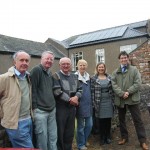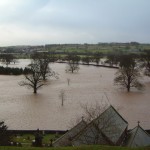This morning, I saw David Cameron on his way to negotiate the treaty on the bail-out of the Eurozone. He looked surprisingly calm, given the worries of the last fortnight: Britain has announced its worst economic figures since the Second World War; Egypt’s economy is collapsing; Syria is approaching civil war; Iran has taken another step towards the bomb, and has sent a mob to ransack the British Embassy; and now the Prime Minister is drawn again into the European crisis. Britain is not in the Euro-zone, has no intention of joining, and is not a major contributor to the rescue package. But Europe is our closest neighbour and trading partner. And the European Union has been, for decades, a phenomenon which has divided and traumatised the Conservative party. So while the Prime Minister’s priority in this treaty negotiation is to minimise damage to our own economy, he also hopes to get some powers back from Brussels.
How hard should he push for concessions? Might Merkel and Sarkozy understand the depth of British feeling about over-regulation, and make a gracious gesture? Or would they feel blackmailed at a vulnerable time and respond bitterly? Would they feel they need our support (to enforce their rules through the European court, for example)? Or would they feel they can do without us? And if they ignored us, and made the treaty as an inner group of seventeen, would this mean only a couple of amendments which affected the Euro-zone, but were irrelevant to Britain? Or might the seventeen impose budget rules, unify their labour laws, and financial laws, and create an inner bloc, which would undermine British services, without our influence? Are the French and Germans themselves divided over the European Commission, the nation state, and nations’ obligations to each other? And what will become of the Euro-zone? A group of sixteen countries, if Greece leaves? Or eighteen, if someone else joins? Or no-one, if the whole thing collapses? Would Greece’s departure make the zone more credible, or would it topple the rest of the system as it goes?
These, and a dozen other questions, including the views of his own back-benchers, haunt the Prime Minister’s strategy. None are a closed set of clear questions, with only two answers from which he has only to select a single combination, and derive a single policy. If he could say confidently, ‘the Treaty is an existential threat, we can stop it, and Europe won’t resent our attempt’; or conversely, ‘the Treaty isn’t a threat, we can’t stop it, and Europe would resent our attempt’, he would be certain whether or not to stop it. But, instead he may feel that the Treaty is a potential threat without being certain how severe; that Britain has some power to stop it but our leverage is weak; that Europe will resent it but it is not clear how seriously or how dangerously; and that there may be merit even in a veto that fails. Meanwhile, the global context in which he is working, continues to deteriorate.
After eighteen months of international conferences and policy papers, seminars and rescue packages, Europe has not stabilised. Greece is still unwilling to leave the Euro, and still unwilling to make the reforms to avoid leaving the Euro; Italy, our third largest economy, is struggling to borrow at affordable rates. The market continues to fret and lose and profit, and Germany continues to become every day more powerful than its neighbours. Day by day, the risks, not just for Portugal, but for Britain, and even the United States, increase. The price of failure now seems many times deeper and harsher than anything we have experienced in the last five years. But what is the magic formula which can reassure the markets now? Stability mechanisms, Euro-bonds, credit-easing, Chinese sovereign wealth support, and supply side reforms? Financial integration and budgetary supervision? And how much money is required now? One trillion? Three trillion? Unlimited guarantees from the European Central Bank?
What will European governments and their tax-payers accept? What is the limit to their self-sacrifice, altruism, and commitment to the project? And can we even be sure what effect Europe has on the British economy? Is it simply a stifling restrictive environment which costs us eight billion pounds in lost competitiveness, and another eight billion pounds in membership fees, and which we could leave, while shedding regulations, and keeping our free access to markets? Or might Europe prevent us from following the Swiss lead of free trade without membership? And are we sunk so deep into the European economy (with three millions jobs and fifty per cent of our trade dependent on Europe) that Britain could hardly survive outside the Union?
Cameron will do his best to bring Britain out of this particular Treaty negotiation, and protect us from this particular crisis. But Britain’s strategy and approach in Europe and the world, over the next decades, must ultimately be rooted in a public debate. We, as citizens, need to drive the detailed, vigorous questioning, which alone can determine the balance of our dreams, our income, and our interests. It will not be easy to create or recreate such a political culture. But we cannot allow, indefinitely, our relationship to our closest neighbors to be reduced to the calculations of economists, the improvisations of statesmen, and a simple ‘yes’ or ‘no’ on a referendum paper.















